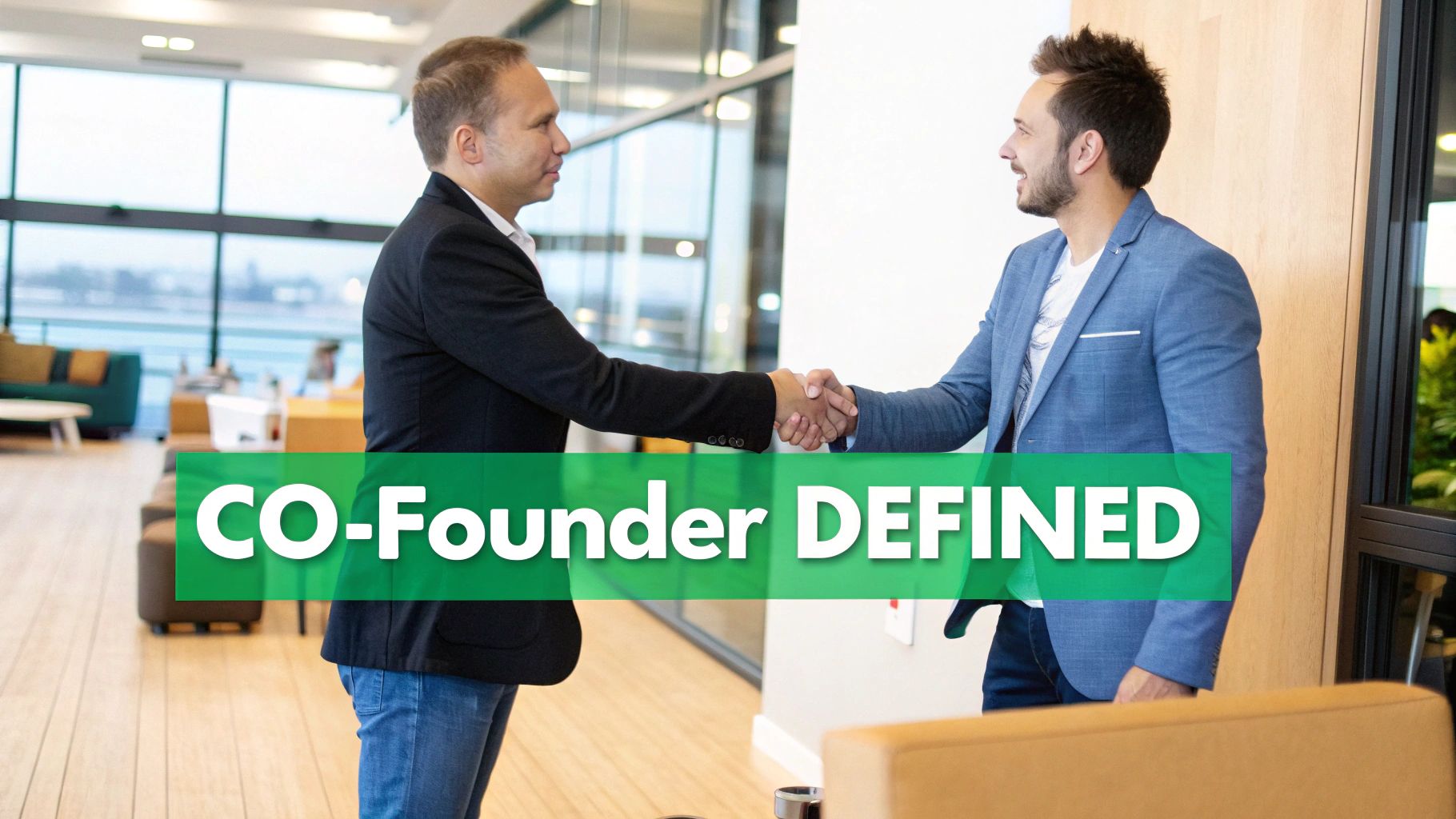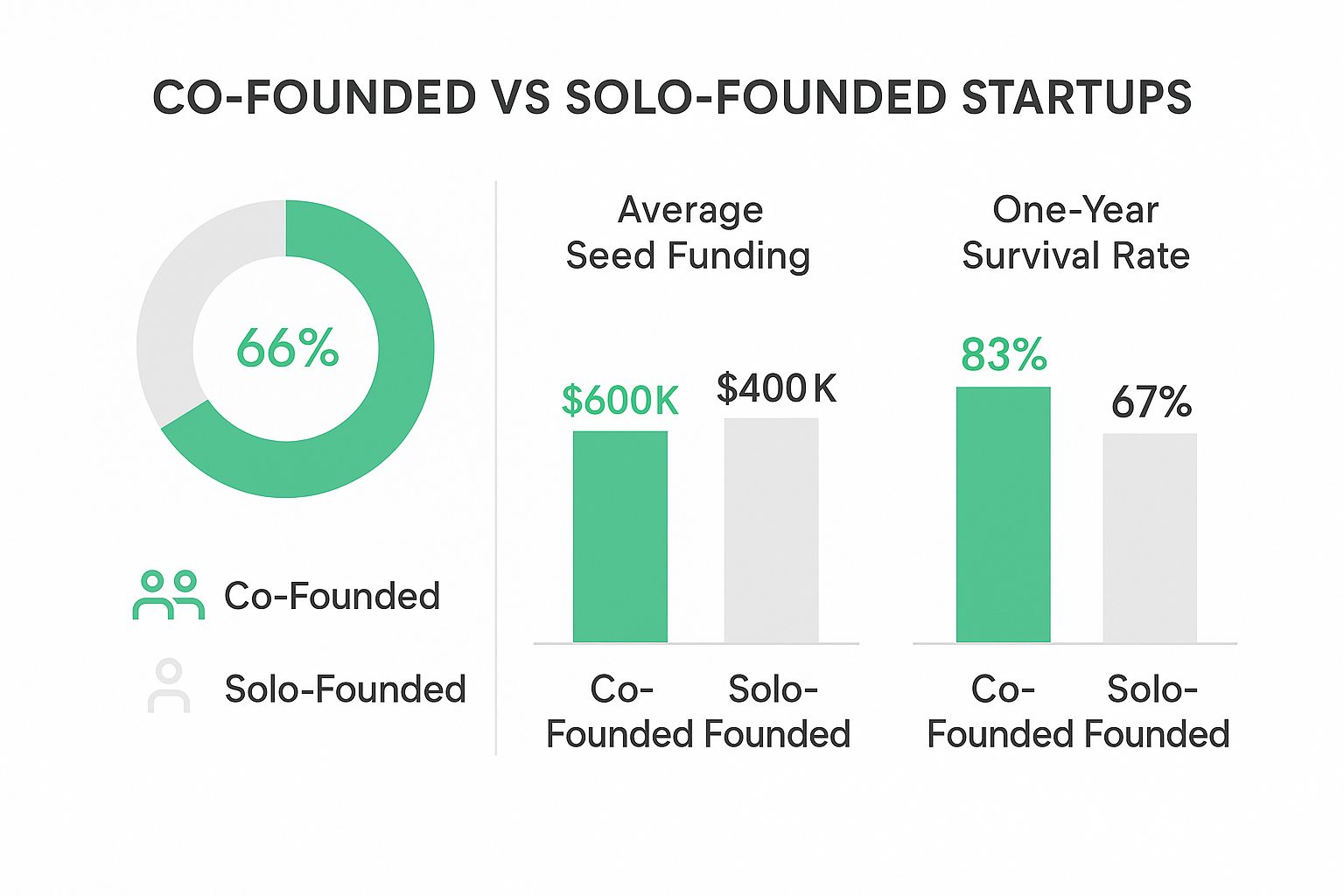What Is a Co-Founder: Beyond Just a Business Partner

A co-founder is much more than a simple business partner. They're a vital ally in the often-difficult journey of building a startup. They share the risks, contribute essential skills, and offer crucial support during both the highs and lows. This foundation of collaboration truly sets a co-founder apart from an early employee or an investor.
The Defining Characteristics of a Co-Founder
What truly distinguishes a co-founder? Several key factors define this unique partnership:
Shared Vision: Co-founders are connected by a shared vision for the company’s future. They’re deeply committed to the long-term success of the venture, not just quick wins.
Active Contribution: Co-founders don't just offer advice; they actively participate in daily operations and strategic decision-making. This hands-on involvement is essential, especially in the beginning.
Significant Equity: Co-founders typically hold a substantial equity stake, reflecting their ownership and commitment to the company’s growth. This shared ownership fosters responsibility and aligns everyone's goals.
Joint Responsibility: Co-founders share the responsibility for the company’s success or failure. This accountability encourages collaborative problem-solving and pushes them to achieve their objectives.
These core elements distinguish co-founders from other important players in the startup world. Early employees, while vital for executing tasks, may not have the same level of ownership or strategic input. Investors provide crucial capital but aren't usually involved in the daily operations. The role of co-founders extends beyond financial success; they are integral to the company’s very formation and growth. For example, solo founders made up 35% of all incorporated companies in 2024, but they represented just 17% of launched companies that secured funding that same year. This difference highlights the difficulties solo founders face in securing funding and suggests that having co-founders can improve the chances of attracting investment. Learn more about this trend: Find more detailed statistics here.
The Crucial Role of Co-Founders in Early-Stage Startups
Co-founders often take on various roles in the critical early stages of a startup. These roles can overlap and change, reflecting the dynamic nature of startups.
Technical Development: A technically proficient co-founder can lead product development, building a solid foundation for the company’s core offerings.
Business Operations: A business-focused co-founder concentrates on strategy, marketing, sales, and raising capital – driving the company’s overall growth.
Company Culture: Co-founders are key in shaping the company culture, establishing its values, work ethic, and team dynamics.
This division of responsibilities lets each co-founder use their strengths while working towards a common goal. Navigating early-stage challenges, such as securing funding, requires strong co-founder relationships. Learn about one startup’s funding experience: Raising a Seed Round on Zoom during COVID. Combining their efforts creates a synergy that moves the startup forward with more speed and resilience than a solo founder could typically manage. This collaboration leads to more effective problem-solving, improved risk management, and a greater chance of ultimate success.
Why Co-Founders Drive Startup Success (With Evidence)

Bringing on a co-founder is a pivotal early decision for any startup. While maintaining complete control can be tempting, data consistently shows that co-founders significantly improve a startup's chances of success. It's not just about sharing the workload; it's about building a stronger foundation for growth.
The Power of Shared Vision and Complementary Skills
Co-founders bring more to the table than just extra help. They offer diverse perspectives and skills, complementing your strengths and addressing your weaknesses. This creates a more balanced team equipped to handle the complexities of building a business.
For instance, pairing a tech-focused co-founder with a business-minded individual can be incredibly effective. This blend of innovation and execution provides a crucial advantage in a competitive market.
Sharing leadership responsibilities also lessens the pressure and stress of running a startup. This shared burden fosters mutual support, boosting morale and helping prevent burnout. Having a trusted partner for brainstorming and decision-making leads to more informed strategic choices.
Investors Often Favor Co-Founded Ventures
Investors recognize the value of a strong co-founding team. They understand that a diverse and capable team is better equipped to overcome challenges, adapt to market changes, and ultimately deliver returns. This translates to increased investor confidence and potentially better funding opportunities.
This trend is evident in the rise of "unicorns," privately held companies valued at $1 billion or more. A co-founder is a crucial component in the startup ecosystem. As of January 2025, there were over 1,565 unicorn startups globally, up from 494 in 2019. This significant increase highlights the collaborative nature of successful startups, often driven by multiple co-founders. Find more detailed statistics here.
Turning Challenges into Opportunities
The startup journey is full of ups and downs. Co-founders offer essential support during challenging times, helping navigate obstacles and turning potential setbacks into breakthroughs. This mutual support strengthens the venture, increasing its resilience.
Building a company is an emotional rollercoaster. Having a co-founder allows for shared experiences, providing emotional support and maintaining momentum when facing difficulties.
A strong co-founding team offers a powerful combination of skills, support, and shared vision. This translates to a more resilient, adaptable, and ultimately successful business.
Finding Your Perfect Co-Founder Match (Without Settling)
Finding the right co-founder is like finding the perfect business partner – someone who complements your strengths and shares your vision. The wrong co-founder, however, can significantly impact your startup's trajectory. This section explores how to identify a partner who not only enhances your skills but also aligns with your long-term goals and work ethic.
Beyond Surface-Level Compatibility: Assessing True Alignment
Choosing a co-founder shouldn't be based solely on existing friendships or shared hobbies. Shared passion for the business, complementary skill sets, and aligned long-term goals are crucial. Evaluate potential partners based on their commitment, how their expertise fills your gaps, and whether their vision for the company aligns with yours.
For example, if you excel at the technical aspects, a co-founder with expertise in marketing and sales could be an ideal fit. This allows you to focus on product development while your co-founder focuses on building the market and acquiring customers.

This infographic highlights the differences in startup outcomes between solo-founded and co-founded ventures. It compares the percentage of each type of startup, their average seed funding, and one-year survival rates. As the infographic illustrates, co-founded startups often secure higher seed funding and have better survival rates. This emphasizes the importance investors place on strong founding teams. Finding experienced guidance can be vital, especially when scaling a startup. For more on this, explore the benefits of working with Startup Consultants.
Where to Find Potential Co-Founders: Exploring Effective Channels
Connecting with potential co-founders requires a strategic approach to networking. Consider these avenues:
Industry Events: Attending conferences, workshops, and meetups can connect you with like-minded individuals in your field.
Online Communities: Platforms like IndieMerger offer dedicated spaces to connect with verified founders actively seeking co-founders.
University Networks: Leverage alumni groups and university entrepreneurial programs to find potential partners.
Accelerator Programs: Participating in accelerator programs offers valuable opportunities to meet and collaborate with other driven entrepreneurs.
Each approach offers unique advantages. Online platforms offer targeted matching based on specific criteria, while in-person events foster more organic connections.
"Trial Periods": Revealing True Strengths and Weaknesses
Before fully committing to a co-founder relationship, consider a "trial period." This practical approach allows you to assess how you work together under pressure. Collaborate on a small project or tackle a specific challenge together. This will provide valuable insight into communication styles, problem-solving approaches, and commitment levels.
To better understand the dynamics of a successful co-founder partnership, let's look at the key qualities versus common misconceptions:
To better understand the dynamics of a successful co-founder partnership, the following table outlines key qualities to look for and contrasts them with common misconceptions:
Essential Co-Founder Qualities vs. Common Misconceptions
This table contrasts what truly matters in a co-founder relationship against common misconceptions that lead to poor partnership decisions.
| Quality/Characteristic |
Why It Matters |
Common Misconception |
| Shared Vision |
Ensures long-term alignment and reduces the risk of conflict down the line. |
Believing similar interests are enough for a strong foundation. |
| Complementary Skills |
Creates a well-rounded team capable of handling diverse challenges. |
Thinking having identical skillsets will lead to efficiency. |
| Strong Communication |
Enables effective problem-solving and fosters a healthy working relationship. |
Assuming communication will naturally be smooth without effort. |
| Mutual Respect |
Builds trust and allows for constructive feedback and open dialogue. |
Believing a hierarchical structure is necessary for success. |
| Commitment and Dedication |
Ensures both founders are equally invested in the success of the venture. |
Assuming initial enthusiasm equates to long-term dedication. |
A trial period can reveal valuable insights into a potential co-founder's work style and true capabilities. It also highlights potential blind spots and areas for improvement, helping you determine long-term compatibility and make a more informed decision.
Diverse Co-Founding Teams: Your Secret Advantage

Building a successful startup is a challenging endeavor. A strong foundation is essential, and that often begins with the founding team. While the search for a co-founder can be difficult, assembling a diverse co-founding team offers a real competitive advantage. This isn't about checking boxes; it's about leveraging the power of varied perspectives.
Cognitive Diversity: The Engine of Innovation
Cognitive diversity, the differences in how individuals think and approach problem-solving, is a key driver of innovation. Co-founders with diverse backgrounds, experiences, and skill sets bring unique insights to the table. This variety allows teams to identify market opportunities that others might miss and create more inclusive products with broader market appeal.
For instance, a team with varied cultural backgrounds can often better understand the nuances of a global market. This can lead to more effective product development and marketing strategies. A team with a mix of technical and business expertise can approach challenges from multiple angles, leading to well-rounded solutions.
The Business Advantages of Diverse Teams
The benefits of diversity are not just theoretical; they translate into tangible business advantages. Diverse teams consistently demonstrate higher levels of creativity, resulting in more innovative products and services. This is a significant advantage for startups trying to establish themselves in a competitive market.
A diverse team can better represent and understand a wider customer base. This deep understanding can inform targeted marketing campaigns, build stronger customer relationships, and ultimately, increase market share. In today's interconnected global marketplace, understanding different cultures and consumer behaviors is crucial.
Furthermore, co-founders can significantly influence a startup's financial success. Research by FirstRound reveals that startups with a female co-founder performed 63% better for their venture capital investors than all-male teams. This clearly demonstrates the value of diverse perspectives. You can explore this topic further: Find more detailed statistics here.
Building an Intentionally Diverse Team
Creating a diverse co-founding team requires a proactive and intentional approach. It means looking beyond your existing network and actively seeking out individuals from different backgrounds.
Consider attending industry events specifically focused on underrepresented groups in tech. Partnering with organizations that promote diversity in entrepreneurship can also be beneficial. Platforms like IndieMerger can connect you with a diverse pool of verified founders.
IndieMerger specializes in connecting entrepreneurs with complementary skills. This facilitates the creation of diverse and well-rounded co-founding teams. This focused approach can significantly reduce the time and effort required to find a suitable co-founder. It’s particularly valuable for solo founders seeking to expand their team with the right expertise.
Overcoming Communication Challenges
While diverse teams offer many advantages, they can also present unique communication challenges. Different communication styles, cultural nuances, and varied perspectives can sometimes lead to misunderstandings. However, these potential friction points, if managed effectively, can become sources of innovation and resilience.
Open and honest communication is paramount. Establish clear communication channels and foster a culture of respect and active listening. Regularly checking in with team members, proactively addressing concerns, and celebrating successes together can strengthen team cohesion and improve collaboration. By embracing these practices, diverse co-founding teams can harness their collective strengths to achieve extraordinary results.
Structuring Co-Founder Agreements That Actually Work
The initial thrill of launching a startup is often accompanied by a sense of shared optimism. However, it's essential to address potential disagreements before they escalate. This is where a well-drafted co-founder agreement comes into play. These agreements aren't about anticipating failure; they're about establishing a strong foundation for success by clarifying roles, responsibilities, and mutual expectations from the start.
Key Components of an Effective Co-Founder Agreement
A comprehensive co-founder agreement should encompass several vital areas to protect all parties involved. Consider it a roadmap for your entrepreneurial journey together, outlining how you'll navigate both successes and potential challenges.
Equity Division: Clearly define each co-founder's ownership percentage. This should accurately reflect individual contributions, roles, and long-term commitment to the venture.
Vesting Schedules: Implementing vesting schedules ensures that equity is earned gradually over time. This incentivizes long-term dedication and safeguards the company if a co-founder departs prematurely. This is standard practice in most startup equity structures.
Decision-Making Framework: Outline a clear decision-making process, specifying who holds authority in various areas of the business. This eliminates ambiguity and streamlines operations.
Responsibilities and Roles: Clearly delineate each co-founder's responsibilities and roles within the company. This helps prevent overlaps, confusion, and potential conflicts down the road.
Exit Strategies: Establish clear protocols for how co-founders can exit the company. This should include scenarios like buyouts, voluntary departures, and potential disagreements.
For instance, imagine a situation where a co-founder unexpectedly decides to leave. A well-defined exit strategy outlines how their equity will be handled, preventing disputes and protecting the remaining co-founders' interests.
Addressing Sensitive Scenarios Proactively
Beyond outlining roles and responsibilities, a co-founder agreement should also address potential challenges before they become major issues. This proactive approach can prevent emotional conflicts and legal battles later on.
Co-founder Departures: Establish a clear process for handling both voluntary and involuntary departures. This protects the company and the remaining co-founders' investments.
Performance Issues: Define how performance issues will be addressed, ensuring that accountability mechanisms are in place from the outset.
Strategic Disagreements: Outline a framework for resolving major strategic disagreements, providing a path forward even when opinions diverge.
For example, if two co-founders have fundamentally different visions for the company's future, a pre-agreed dispute resolution process can help navigate these situations constructively, preserving both the partnership and the company.
Building a Foundation for a Resilient Partnership
Co-founder agreements are more than just legal documents; they form the bedrock of a strong and resilient partnership. They ensure everyone is aligned, creating transparency and minimizing the potential for conflict.
To illustrate the key elements that should be included, consider the following table:
Co-Founder Agreement Essentials
Key components that should be included in any comprehensive co-founder agreement to protect all parties and define the partnership clearly
| Agreement Component |
Purpose |
Potential Consequences If Omitted |
| Intellectual Property Rights |
Clarifies ownership of IP created during the partnership. |
Disputes and legal battles over ownership, hindering company growth and potentially leading to costly litigation. |
| Non-Compete Provisions |
Prevents co-founders from starting competing ventures. |
Loss of market share and potential damage to the company's competitive advantage, weakening its position in the market. |
| Commitment Expectations |
Defines the expected time commitment and level of involvement from each co-founder. |
Unequal contributions and potential resentment among co-founders, creating an imbalance in workload and potentially affecting morale and productivity. |
These agreements provide a framework for navigating the inherent challenges of building a startup. They foster trust, promote open communication, and help establish a solid foundation for a successful and lasting partnership. Platforms like IndieMerger, which connects verified founders, underscore the importance of compatible partnerships. This highlights the growing understanding that a well-matched co-founder is essential for startup success. Explore IndieMerger to learn more: Find a Co-founder on IndieMerger.
Nurturing Co-Founder Relationships That Endure Challenges
Building a startup is a marathon. Even the strongest co-founder relationships will face stress and conflict. This is normal when building something from scratch. The key is developing communication and conflict resolution strategies to navigate these challenges.
Establishing Effective Communication Rhythms
Successful co-founders prioritize open communication. This means regular check-ins, not just for updates, but to discuss challenges and concerns. These rhythms should accommodate different working styles while ensuring critical information flows freely.
Some teams thrive on daily stand-up meetings. Others prefer weekly or bi-weekly strategy sessions. The frequency is less important than the consistency and quality of the interaction.
Regular communication builds trust and shared responsibility. It also prevents minor issues from becoming major conflicts. Open dialogue creates a safe space for honest conversations, allowing the team to address challenges directly.
Resolving Conflicts Constructively
Disagreements are inevitable. How you handle them determines your partnership's health. Successful co-founders see conflict as an opportunity for growth.
Addressing friction points, like workload imbalances or strategic disagreements, before they escalate is crucial. This proactive approach minimizes tension and resentment. Effective conflict resolution involves active listening, empathy, and a willingness to compromise. This ensures everyone feels heard and respected.
Building a Support System and Evolving Decision-Making
Thriving founding teams understand mutual support. They create an environment where co-founders can rely on each other, professionally and personally. This support fosters resilience, especially during tough times.
Successful co-founders also establish decision-making frameworks that evolve with the company. This might involve defined roles, regular meetings with voting procedures, or a combination of approaches. This flexibility ensures efficient decision-making as the company grows.
By nurturing the co-founder relationship through open communication, constructive conflict resolution, and mutual support, you build a lasting partnership. A strong foundation of trust and respect is crucial for navigating the complexities of building a successful venture.
Ready to find your perfect co-founder match? IndieMerger connects verified founders with complementary skills. Start your search today: Find a Co-founder on IndieMerger.